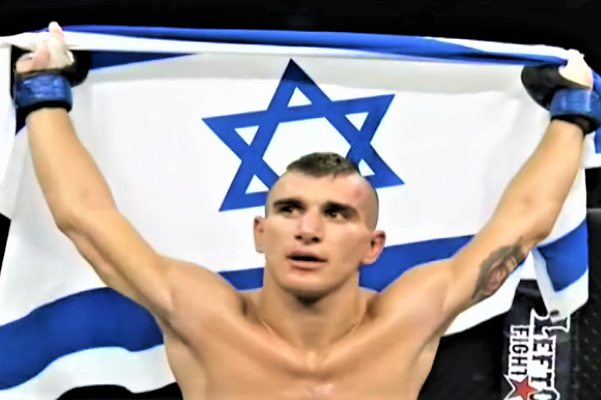‘It’s about making Israelis stronger, Jewish communities stronger,’ Levy said.
By Mike Wagenheim, JNS
Natan Levy proudly carries the banner for Israel into the octagon as a mixed martial arts fighter in the Ultimate Fighting Championship (UFC). But at a time of heightened antisemitism, the Paris-born Israeli is insistent that all Jews should be able to fight for themselves.
“They’re gonna hate us, whether you’re confident or you’re not,” Levy told JNS of antisemites, who he said he long ago learned he couldn’t reason with. “Whether you practice Judaism or not, for them, you’re always going to be a Jew. So a Jew needs to be strong, needs to be self-reliant. And this is the way to move forward.”
This week, in the Fight Factory gym atop a Jewish community center in the Brighton Beach neighborhood of Brooklyn, N.Y., Levy, 32, provided a free seminar for those who looked like they’d been in a fight before and those who appeared to be throwing their first punches.
“I wanted to teach them some self-defense moves. But mostly, I wanted to inspire them to keep training because one hour is not going to help,” he told JNS. “You need to train regularly; you need to be strong, you need to be fit, you need to have knowledge of the techniques, you need a strong mind. Today was to give them a taste and inspire them to keep training.”
Levy provided instructions on a proper fighting stance, punching techniques, keeping would-be attackers at arm’s length and defending against someone within close range.
With approximately 100 people gathered on a wall-to-wall mat, Levy—sporting his signature black “Jew Jitsu” T-shirt—first showed participants how to balance their weight, pushing back slightly on their front foot before carrying forward to throw a jab.
Then, it was on to turning the back heel and hips to deliver a full blow. Rinse and repeat until everyone got the hang of it.
‘I hope they keep training’
After each portion of instruction, Levy asked everyone to partner up, creating combinations of husbands and wives, boyfriends and girlfriends, mothers and daughters and regular sparring partners. Some practiced intently. Others did so with laughter, amused by their own novice status.
Levy made sure to make the rounds, engaging with them and fine-tuning their skills where needed.
Participants also learned how to use their open hands—one to swat away the hand of an aggressor and the other to forcefully push through the aggressor’s chest to gain distance.
At one point, Levy took aside a younger boy, encouraging the youth to display what he had just learned. Taking a punch to the midsection, Levy pointed to a lower to his gut, explaining a punch landing there would have more impact.
Levy also showed attendees how to break loose from an aggressor’s grip, using a quick, sharp jerking motion—and joking that one had to take care not to poke one’s eye or punch oneself in the head in the process.
He finished the session with a question-and-answer period with queries ranging from specifics of certain techniques to broader inquiries about his professional career.
“I hope it carries over, and I hope they keep training. This is my goal. And if not, I do hope it put them in good spirits,” Levy told JNS. “I hope everybody left healthier and stronger than they got in.”
Ultimately, he said, simply channeling the courage to challenge antisemites is a critical part of fighting Jew-hatred, even before one throws a punch.
“There is nothing to be ashamed of about being Jewish and Israeli. For me, it’s about making Israelis stronger, Jewish communities stronger,” Levy said. “And usually, the bullies are cowards. Usually, when somebody stands up to them, they fall.”
